Sepsis 2025
Sepsis 2025 was held as a joint meeting with the Latin American Sepsis Institute in Sao Paulo, Brazil, May 22-23 2025.
Sepsis 2025 was held as a joint meeting with the Latin American Sepsis Institute in Sao Paulo, Brazil, May 22-23 2025.
Sepsis 2024 was held as a joint meeting with the Canadian Critical Care Forum in Toronto, Canada, November 17-20 2024.
We are sorry to announce that Sepsis 2023 has been canceled due to the ongoing situation in Israel.
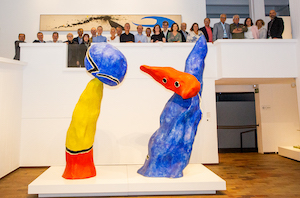
Sepsis 2022 joined with the International Symposium on Infections in the Critically Ill Patient on 13 & 14 October 2022 in Barcelona Spain.
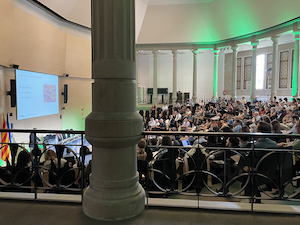
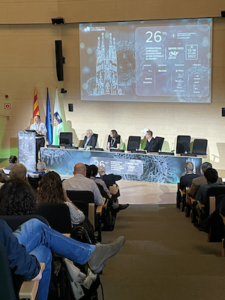
A virtual joint meeting with the International Sepsis Forum (ISF), the African Sepsis Alliance (ASA) and the Rwandan Emergency Care Association (RECA).
Sepsis 2021- Day 1: Welcome Ernest Nahayo,, Emmanuel Nsutebu, Thierry Calandra, and plenary : The Viewpoint from Africa
Sepsis 2021- Day 1: Session 1: The Challenges we Face Chair- Thierry Calandra, Switzerland.
Sepsis 2021- Day 1: Session 2: Epidemiology of Sepsis in Resource-variable Settings– Chair- Kathy Rowan, UK
Sepsis 2021- Day 1- Session 3: Tackling Some of the Pathogens Contributing to Sepsis in Africa, Chair- Joost Wiersinga
Sepsis 2021- Day 1- Session 4: Recognizing and Managing Sepsis. Chair- Flavia Machado, Brazil.
Sepsis 2021- Day 1- Plenary Lecture 3: The Many Faces of Sepsis-Niranjan “Tex” Kissoon
Sepsis 2021- Day 2: Session 5: Early Identification, Triage, and Diagnosis of Sepsis. Chair: Nate Shapiro, USA
Sepsis 2021- Day 2: Session 6: Early Resuscitation and Stabilization
Chair: Mervyn Singer, UK
Sepsis 2021- Day 2: Session 7: Clinical Challenges of Treating Maternal, Pediatric and Neonatal Sepsis in Africa
Chair: Adrienne Randolph, USA
Sepsis 2021- Day 2: Session 8: Prevention and Pre-hospital Care of Sepsis in Africa
Chair: Shevin Jacob, Uganda
Sepsis 2021- Day 2: Session 9: Improving Long-term Morbidity and Mortality
Chair: Hallie Prescott, USA
Sepsis 2020 was a 2-day virtual meeting.
Program Chairs were John Marshall, Canada and Christopher Seymour, USA.
Sepsis 2020- Day 1: Welcome Mervyn Singer, and plenary : Maladaptive host response in sepsis and COVID-19 Kenneth Baillie
Sepsis 2020- Day 1: Topic 1: Sepsis Now: what to do first? Chair- Christopher Seymour, US. Speakers- Matthieu Komorowski, UK, Nathan Shapiro, US & Erin McCreary, US
Sepsis 2020- Day 1: Topic 2: Around the World– Chair- Flavia Machado, Brazil; Speakers- Kristina Rudd, US, Jorge Salluh, Brazil, Emmanuel Nsutebu, UK
Sepsis 2020- Day 1- Topic 3: Back to basics, Chair- John Marshall, talks by Glenn Hernandez, Chile, Michael Bauer, Germany, Matteo Bassetti, Italy and Erin McCreary, US
Sepsis 2020- Day 1- Topic 4: New Science in Sepsis: what clinicians need to know. Chair- Mervyn Singer, UK. Speakers: Also Fox-Robichaud, Canada, Bas Haak, Netherlands & Robert Dickson, US
Sepsis 2020-Day 1: Topic 5: Harnessing the immune system for good. Chair- Manu Shakar-Hari, UK. Speakers- Fabienne Venet, France, Tom van der Poll, Netherlands, Sarah Sasson, Australia
Sepsis 2020 -Day 1- Topic 6: Fixing sepsis takes a team.
Chair- Nathan Shapiro. Speakers- Orlaith Staunton, US, Jeremy Kahn, US, Deena Costa, US & Robert Quinn, US
Sepsis 2020- Day 1- Topic 7: Sepsis myths:don’t believe everything you learned.
Chair: Christopher Seymour, US. Speakers: Brendon Scicluna, Netherlands, Thierry Calandra, Switzerland & Toe Coe, US
Sepsis 2020- day 2: Welcome and plenary: Living with COVID: A view from the Campus
Speaker: Preeti Malani, US
Sepsis 2020 Day 2: Topic 1: Insights from genetics and epidemiology
Chair: Kenneth Baillie. Speakers: Mervyn Singer, UK, Kenneth Baillie, UK, Maurizio Cecconi, Italy & Flavia Machado, Brazil
Sepsis 2020 Day 2- Topic 2: COVID treatment: Old, new, or somewhere in between?
Chair Joost Wiersinga, Netherlands. Speakers: Hallie Prescott, US, Joost Wiersinga, Netherlands, Anthony Gordon, UK & Bryan McVerry, US
Sepsis 2020 Day 2: Topic 3: COVID outside the lung
Chair: Michael Bauer, Germany, Speakers: Sherry Chou, US, Frank van de Veerdonk, Netherlands, Ryan Zarychanski, Canada & Adrienne Randolph, US
Sepsis 2020 Day 2: Topic 4: Corticosteroids for COVID: Who, what, and what and when?
Speakers: Kenneth Bailie, UK, Srinvas Murthy, Canada, Lennie Derde, Netherlands
Sepsis 2020 Day 2: Topic 5: A failed stress test?
Chair: Fernando Zampieri, Barzil. Speakers Petra Dickmann, Germany & Paul Young, New Zealand
Sepsis 2020- day 2: Topic 6 and Closing Remarks: Lessons learned from 6 months of COVID science Speakers: Christopher Seymour, US, Howard Bauchner, US & Steve Webb, Australia

Named in honor of our esteemed colleague Stephen F. Lowry who passed in 2011, these annual colloquia focus on key topics in the sepsis field and are designed to be highly discussive and thought provoking.
MORE
1st International Sepsis Forum on Sepsis in Infants and Children:This closed meeting was organized by the Pediatric Acute Lung Injury and Sepsis Investigative (PALISI) network and the ISF. It was sponsored by the Mannion Family Fund, The Center for the Critically Ill Child, Division of Critical Care Network, Children’s Hospital Boston, The Palisi Network and the ISF. September 2004. Pediatric Critical Care Medicine 2005 Vol.6/no.3.S1-S164. Click here for downloadable articles.
Shock Society/ISF Symposium: A closed symposium jointly sponsored by the Shock Society and the ISF on the Translation Biology of Acute Illness: Pre-Clinical Models of Shock, Trauma & Sepsis. The meeting was held at Oak Island, Nova Scotia, Canada, June 2004. Shock Vol. 24, Supplement 1, 2005
Consensus Conference on Infection Definitions in the ICU
Program Chairs: Jonathan Cohen, UK and Thierry Calandra, CH. This closed conference was held in Coral Gables, FL. Click here to view the program in PDF format. Consensus Conference Critical Care Medicine 2005, Vol.33/no.7. 1538/1548
ATS 2000,96th International Conference, Toronto, “Symposium: The Heart in Sepsis.”
American Thoracic Society (ATS) Critical Care Assembly Project, “Expert Workshop on Appropriate Use of Colloids in Medical Critical Illness.”
UK Medical Research Council International Workshop on Clinical Trial Design, February 2000, London, “How should we be designing clinical trials in sepsis in the critically ill?”
21st International Congress of Chemotherapy workshop 1999, “Trials and Serious Sepsis.”
UK Medical Research Council International Workshop on Severe Sepsis, 1999.
LESS
ISICEM: ISF award to B. Woolley et al. Pittsburg, U.S.
Sepsis/Septic shock: management A430-Variation in reinforcement learning-guided treatment by clinical sepsis subtype
ESCMID Global: ISF award to Dr. Andrew Moore from Stanford together with Prof. Brigit Lamy, the chair of ESGBIES
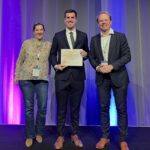
ISICEM: ISF award to Luregn Schlapbach – Zurich, Switzerland
Host gene expression signatures in children evaluated for Sepsis
WFPICCS: ISF awards given out at WFPICCS in 2024:
A TRIAL TO DETERMINE WHETHER SEPTIC SHOCK REVERSAL IS QUICKER IN PEDIATRIC PATIENTS RANDOMIZED TO AN EARLY GOAL-DIRECTED FLUID-SPARING STRATEGY VS. USUAL CARE (SQUEEZE), presenter: Melissa Parker, Canada
CONTINUOUS VS. INTERMITTENT BETA-LACTAM DOSING IN CRITICALLY ILL CHILDREN WITH SEPSIS: CLINICAL OUTCOMES OF A RANDOMIZED CONTROLLED TRIAL., presenter: Ayesha Bibi Khan, South Africa
ESCMID: The ISF best abstract awardee 2024 at ESCMID is Bieke Tack from Leuven Belgium.
For the Abstract on: World Health Organization’s clinical criteria orienting hospital referral and diagnosis of serious bacterial infections in children under-five perform poorly
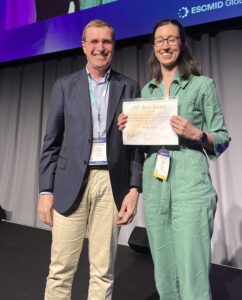
Bieke Tack
University Hospitals in Leuven, Belgium Leuven, Belgium
Bieke Tack graduated as a Medical Doctor at KU Leuven University (Belgium) in 2017 and continued her medical training as pediatric resident at the same university. As pediatric resident, she started in a Belgian general hospital and is now working in the pediatric and neonatal wards of the University Hospitals in Leuven (Belgium). From 2018-2023, Bieke was affiliated as PhD candidate to the Unit of Tropical Bacteriology of the Institute of Tropical Medicine Antwerp (Belgium) and the department of Microbiology, Immunology and Transplantation of KU Leuven (Belgium). Her PhD research was focused on invasive non-typhoidal Salmonella (iNTS) infections in children in sub-Saharan Africa with field work in Kisantu general referral hospital (DR Congo). She has published on the (seasonal) epidemiology of bloodstream infections and malaria co-infections, on the prehospital trajectory and recognition of children with severe febrile illness, on the clinical presentation of bloodstream and iNTS infections, and on antimicrobial susceptibility testing, resistance and treatment of iNTS infections. As member of the VacciNTS consortium and co-author of a WHO Vaccine Value Profile for iNTS, she actively participates in advocacy programs for development of an iNTS vaccine. During her field work and research, she experienced the challenges of pediatric febrile illness care in low-resource settings and continues to collaborate with stakeholders from the field, academia, R&D, health authorities, and supranational organizations to improve the quality of diagnostic and therapeutic management of severe febrile illness in children in low-resource settings.
In the awarded abstract, she demonstrated that children under-five admitted to a district hospital in DR Congo with culture-confirmed bloodstream infection were frequently (27% – 55%) missed by clinical WHO criteria for hospital referral (IMCI) and suspicion of bloodstream (GLASS)/serious bacterial infection (PSBI). Revised criteria are needed to accelerate sepsis care.
ISICEM: ISF award t0 L De Bruyn; A Téblick; T Van Oudenhove; S Vander Perre; I Derese; L Pauwels; S Derde; G Van den Berghe; L Langouche, KU Leuven, Department of Cellular and Molecular Medicine, Leuven, Belgium
Hydrocortisone treatment in septic mice increases cholesterol availability without improving adrenal function and with exacerbated wasting of lean tissue
ESCMID: The ISF best abstract awardee 2023 at ESCMID is Claire Dahyot-Fizelier of Poitiers, France
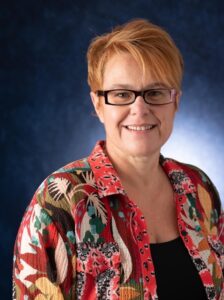
Claire Dahyot-Fizelier
Neuro-Intensive Care Unit at the University Hospital of Poitiers, Poitiers, France
Prof. Dr. Claire Dahyot-Fizelier (female, born in 1972, French) is a professor in anesthesia and intensive care at the faculty of Medicine of Poitiers’ University since 2016. She studied medicine in Caen then anesthesia and intensive care in Poitiers, obtained her Ph.D. in March 2008, became assistant professor in 2009 and professor in 2016 at the University of Poitiers. Claire Dahyot-Fizelier has been practicing anesthesia-intensive care since 2005 at the University Hospital of Poitiers, and since 2012 has been working exclusively in intensive care. Her field of expertise is neuro-intensive care. In 2012, she became head of Neuro-Intensive Care Unit at the University Hospital of Poitiers. Within the U1070 research team, she now focuses her research on the PK-PD of antimicrobial in the central nervous system in extracellular fluids and cerebro-spinal fluid, as well as leading a French multicentre study on this topic, the PKpopLCR trial.
The ISF best abstract awardee 2022 at ESCMID is Wolfgang Stöhr of London, UK
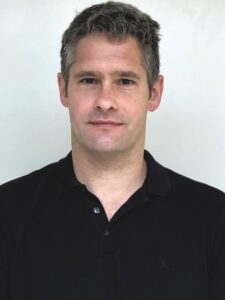
Wolfgang Stöhr
MRC Clinical Trials Unit at UCL Institute of Clinical Trials & Methodology, London, United Kingdom
Wolfgang Stöhr is a Senior Statistician at the MRC Clinical Trials Unit at UCL. Since joining the unit in 2004, he has been working in observational studies and clinical trials in infectious diseases, initially and for many years in HIV, and more recently in paediatric pneumonia and neonatal sepsis. He currently works on the analysis of the NeoOBS study and on the new NeoSep1 trial.
The ISF best abstract awardee 2021 at ESCMID was Isis Ricaño Ponce of Nijmegen, The Netherlands
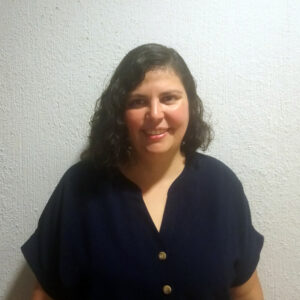
Isis Ricaño Ponce, PhD
Department of Internal Medicine and Radboud Center for Infectious Diseases Radboud, University Medical Center, Nijmegen, the Netherlands
I am doing a postdoc in Prof. Mihai G. Netea’s group and this project is part of the prospective study FUnctional Genomics in SEvere Infections (FUSE), a fantastic collaboration with Anca Riza and Prof. Mihai Ioana from the Human Genomics Laboratory at the Craiova University of Medicine and Pharmacy in Romania. Our team work focuses on integrating different kinds of omic-technologies with clinical data to unravel mechanisms causing sepsis. We integrate genetics, proteomics, transcriptomics, and metabolomics to identify the molecular basis for sepsis heterogeneity. First, to facilitate the diagnosis of sepsis, which might lead to faster treatment and better outcomes. Then, to select better tailored therapies for sepsis patients responding differently to the disease.
The ISF best abstract awardee 2020 at ESCMID was Aislinn Cook, of London, UK
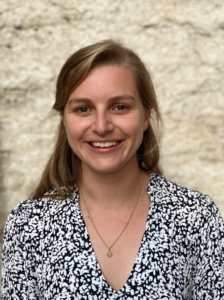
Aislinn Cook
St. George’s University of London in the Paediatric Infectious Diseases Research Group, London, United Kindom
This year’s winner is Aislinn Cook, a research fellow at St. George’s University of London in the Paediatric Infectious Diseases Research Group (London, UK). There she works on clinical presentation, treatment and outcomes of neonatal sepsis, as well as paediatric bloodstream infections. She was awarded the prize for her abstract on the NeoAMR Global Neonatal Sepsis Observational Study (NeoOBS). NeoOBS was launched in July 2018 by the Global Antibiotic R&D Partnership in collaboration with St. George’s University of London, Penta Foundation, University of Antwerp, MRC Clinical Trials Unit at University College London and 19 hospitals in 11 predominantly LMIC countries. The primary objective of NeoOBS is to assess mortality rates of hospitalised infants being treated with significant sepsis; secondary objectives include describing clinical presentation and recovery, sepsis management and microbiological epidemiology. This involved the collection of routine clinical, laboratory and antimicrobial therapy data from approximately 3000 neonates <60 days old with clinically diagnosed sepsis; patients were followed for 28 days. This global multi-centre prospective study will complete recruitment in February 2020 with each site recruiting up to 200 neonates. Data from the study will be used to inform the design of future antibiotic treatment trials for neonatal sepsis.
The ISF best abstract awardee 2019 at ESCMID was Maria João Mendes de Carvalho of Cardiff, UK
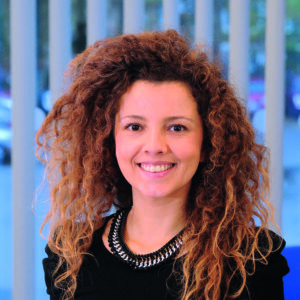
Maria João Mendes de Carvalho
Institute of Infection and Immunity, Cardiff University School of Medicine, Cardiff, United Kingdom
This year’s winner is Maria João Mendes de Carvalho from the Institute of Infection and Immunity at the Cardiff University School of Medicine (Cardiff, UK), where she works at Prof. Tim R. Walsh’ laboratory. She will be presenting her insights on the spread and epidemiology of bacteria and their genetic characteristics, gleaned through the BARNARDS study, of which she is the lead scientist. BARNARDS (Burden of Antibiotic Resistance in Neonates from Developing Societies) is a network of clinical sites among seven different African and South-Asian low- and middle-income countries. It aims at providing the means, support, network and tools to understand the impact of antibiotic resistance on neonatal morbidity and mortality in addition to identifying possible interventions to minimize such impact, particularly, in regards to sepsis in infants <60 days old. During BARNARDS, Maria’s team (i) established the incidence of sepsis of infants <60 days old at these sites, (ii) described the risk factors for sepsis in these infants, (iii) characterized the aetiological agents of sepsis by whole genome sequencing and bioinformatics analysis, and antibiotic susceptibility profiles, and (iv) investigated the epidemiology of multidrug resistant Gram-negative bacteria carried as normal microbiota in mothers and infants and among the clinical sites’ environment, and studied associations between carriage of these genes and sepsis. Maria moved to Cardiff following the completion of her PhD in the Microbiology laboratory at the University of Aveiro, Portugal, funded by the Portuguese Foundation for Science and Technology and conducted under the supervision of Prof Antonio Correia.
The ISF best abstract awardee 2018 at ESCMID was Vinod Kumar of Groningen, Netherlands
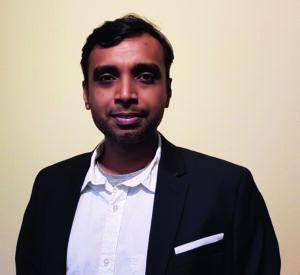
Vinod Kumar
Department of Genetics at the University of Groningen, Groningen, Netherlands
This year’s winner is Vinod Kumar from the Department of Genetics at the University of Groningen. He submitted an abstract about a functional genomics approach to identify novel susceptibility pathways for fungal infections. In his research, Vinod aims to identify human genes and molecular mechanisms that regulate appropriate immune responses and may contribute to susceptibility to sepsis and other infectious diseases. As traditional approaches to find causal genes for sepsis and other infectious diseases have not been very successful, Vinod and colleagues take advantage of state-of-the-art technologies, simultaneously assessing genetics, transcriptomics and immune-profiling in the context of host-pathogen interaction using population-based cohorts and integrating obtained data with patient-genetics. Vinod is discovering new avenues for further investigation and targeted drug discovery for sepsis. For the paper he will present at ECCMID, Vinod and colleagues investigated susceptibility factors for Candida albicans, the most common opportunistic fungal pathogen causing candidaemia bloodstream infection. Not all at-risk patients develop candidemia, suggesting that genetics influence their susceptibility. Cytokines play a critical role in anti-fungal host defense, but a comprehensive approach to understanding the genetic architecture of cytokine responses against fungi and their role in fungal disease susceptibility is still lacking. That is why Vinod and colleagues performed the first genome-wide association analysis (GWAS) using the largest candidaemia cohort of European ancestry to date to identify susceptibility genes. They assessed the cytokine production capacity in different cellular systems following stimulation with three different opportunistic fungal pathogens: Candida albicans, Aspergillus fumigatus and Cryptococcus neoformans. The study suggests that genetic loci that affect cytokine responses to C. albicans can partly explain an individual’s disease susceptibility. Following his PhD in the field of host-pathogen interactions in Germany, Vinod moved to the Netherlands (UMCG, Groningen) to further investigate the complex process of host-pathogen interactions from a genetics point of view to understand the mechanisms of infections. As part of his project, he established strong collaborations with clinicians and computational scientists to perform studies using large patient and population-based cohorts. He demonstrated that genetic variations contribute the most to the variability in innate immune responses to infectious agents, and he identified susceptibility genes to fungal sepsis in the European population.